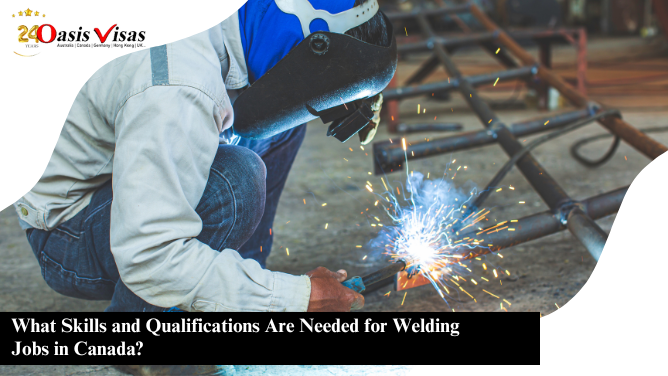
Welding jobs in Canada really create the most interesting opportunity for people interested in working with metal, developing hard structures. They are needed everywhere-from great bridges and tall buildings up to every type of construction, manufacturing, or car industry. Nonetheless, for entry into the welding career, knowledge about the needed skills and qualifications to compete in welding jobs in Canada is required.
More and more, the desire for welding specialists is higher, and more employers like to have the kind of candidate who can exhibit technical capability but is not simply that but also equipped with a good mix of on-the-job skills, an awareness of safety, and educational experience. In the blog post, we delve deeper into what those essential skills and qualifications you require entering a promising career as a welder in Canada are.
Education Qualification for Welding Jobs in Canada
It will begin with welding jobs in Canada to get the right education. Most employers will demand at least a high school diploma or equivalent. After the completion of the high school, prospective welders usually go to the welding program that community colleges and vocational schools offer. Programs can take from several months up to two years of time, depending on what degree level is pursued.
The Canadian Welding Bureau provides different certifications that can boost your chances of getting hired. Many employers require applicants with CWB certification since it is evidence of a recognized level of competency in welding techniques and safety practices. Thus, pursuing a welding program that includes CWB certification will increase your chances of getting a welding job in Canada significantly.
Technical Skills
Technical skills are the requirements for welders in Canada welding job opportunities. The technical skills of a welder include;
- MIG Welding: The process is common and widely preferred since it’s fast and versatile. It suits welding thin metals best.
- TIG Welding: This process is characterized by great precision. It’s highly recommended when welding stainless steel and aluminum.
- Stick Welding: Another name for it is SMAW or Shielded Metal Arc Welding. It mainly finds its application in outside welding and other places wherein the atmosphere cannot be so well controlled.
- Flux-Cored Arc Welding (FCAW): This is similar to the MIG, but a tubular wire filled with flux is used.
These techniques will make you eligible for welding jobs in Canada. Knowledge of welding symbols and blueprints is necessary, so that you would know how to interpret specifications for projects in the right manner and deliver quality work.
Practical Experience to Get Welding Jobs in Canada
In addition to theoretical training, on-the-job experience is also important when applying for welding jobs in Canada. Many programs involving welding include apprenticeships or work placements, providing hands-on skills in actual sites. You will work under experienced welders and be updated on various materials, tools, and techniques during your time under apprenticeship. You can gain much confidence in that, and you can expand a professional network in the welding industry.
In addition, most employers will look for experience in particular industries, such as construction or manufacturing. Demonstrating to them that you can work on various projects and fit in different working environments will make you stand out in the very competitive welding job market in Canada.
Safety Awareness
Safety is the utmost concern with welding jobs across Canada. Welders are at risks from high temperatures, hazardous equipment, and poisonous chemicals. So, safety procedures and practices have to be understood properly. Most safety procedures in welding training cover how to use personal protection equipment, such as a helmet, gloves, or protective clothing.
Important awareness is that of WHMIS. WHMIS provides information about hazardous chemicals in the workplace and enables welders to perform their job safely and carry out products responsibly. Generally, the employers seek their candidates as such who are security conscious as industrial accidents declined and promoted a positive as well as protective culture to the organization.
Soft Skills
Technical skills are a prerequisite, but soft skills can be equally important in a welder’s job in Canada. Some of the significant soft skills of a welder include the following:
- Attention to detail: To avoid costly mistakes and have high-quality welds, welders must pay attention to their work.
- Problem-solving: Problems arise as one goes along in any job, and welders have to think critically and solve them as they come.
- Communication Skills: Welders normally work as a team, thus require proper communication to continue with the other members or colleagues of the team and get information about all the project requirements.
- Effective Time Management: Since deadlines are concerned in welding occupations in Canada, timely performance is concerned.
This list of soft skills is an important area for the candidate to improve performance and, by implication, increase their chance to be selected for the given welding occupation in Canada.
Networking and Industry Knowledge
Networking is a great way to learn of welding jobs in Canada, as well as the types of skills required. Join trade shows, workshops, and networking events to connect with other welders, employers, and industry leaders. Professional associations, such as the Canadian Welding Association, can also provide important resources, training opportunities, and job listings.
Industry trends such as advancements in welding technology and changes in regulations are a plus. You can better position yourself in the job market with knowledge of such industry trends. It is also important that the employers hire individuals who have shown proactive efforts to upgrade their professional skills and have kept abreast of industry changes.
In short, to become a welder in Canada, one needs a mix of education, technical skill, practical experience, safety awareness, soft skills, and knowledge of the industry. With the help of appropriate qualifications and the continued development of skills, you will be better qualified to do well in the industry. As the demands for skilled welders have grown, this is definitely the best time to choose welding as a career. Being new to the profession or in search of an advancement opportunity, knowledge of the competencies and qualifications needed guides one toward becoming a successful welder in Canada. Start now, and you might end up being on your way to a fulfilling welding career!











